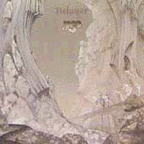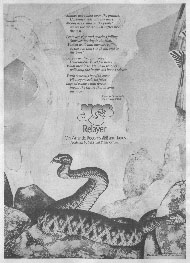![]()
  |

Relayer
Yes
Atlantic SD 18122
Released: December 1974
Chart Peak: #5
Weeks Charted: 16
Certified Gold: 12/18/74
 With their last five albums (including Relayer) reaching Top Five status, Yes are central to the new British Invasion. They combine complex, extended instrumental passages with weighty, quasi-mystical lyrics. The group is far removed from the monolithic theatrics of ELP or the cynical conundrums of Jethro Tull and much more deeply into the mystic than the mellowed mind balm of the Moody Blues.
With their last five albums (including Relayer) reaching Top Five status, Yes are central to the new British Invasion. They combine complex, extended instrumental passages with weighty, quasi-mystical lyrics. The group is far removed from the monolithic theatrics of ELP or the cynical conundrums of Jethro Tull and much more deeply into the mystic than the mellowed mind balm of the Moody Blues.
At first Yes redressed mid-Sixties tunes in progressive trappings, along with elaborate but still melodic compositions of their own. By their third and fourth albums (The Yes Album and Fragile), the cover versions had vanished and the originals lengthened.
 Click image for larger view. |
The most interesting track is "Dear Father," previously unavailable on LP and apparently a plea from a doubtful and confused Jesus. It's a relatively straight pop-rock song, with a recurring chorus full of harmonies and some impressive melodic fragments, and it's literally smothered in an overwhelming orchestral arrangement. An atypical number.
Of all the material on Yesterdays, "America"is most important as a transition point. Later songs became even more intricate, bordering on the unfathomable while the lyrics meandered into murkier mystic modes. Yes's last album, Tales from Topographic Oceans, was four sides' worth of hopelessly dense complexity that left many observers recoiling in utter dismay and taxed even the group's most ardent supporters.
Relayer may exhaust even the devoted. Singer Jon Anderson's words plumb new depths of turgidity. Side one of Relayer is taken up by a 22-minute track called "The Gates of Delirium," a titanic battle-of-the-mind forces allegory of sorts. A sample stanza:
- Choose and renounce throwing chains to the floor
- Kill or be killing faster sins correct the flow
- Casting giant shadows off vast
- Penetrating force
- To alter via the war that seen
- As friction spans the spirits wrath ascending (slowly) to redeem
- Kill or be killing faster sins correct the flow
Pretentious balderdash no matter how you stack it and the remaining lyrics are only marginally clear.
The music seems equally chaotic. Opening with sheets of cascading guitars and wheeling Mellotrons, it breaks off into a fairly melodic vocal segment. This is followed by a seemingly endless frenzy of clattering, discordant guitar work and demoniacal synthesized electronics. Finally an infusion of lyrical guitar and soaring Mellotron signals battle's end, with a strangely MOR-oriented vocal section closing the piece.
On the other side, "Sound Chaser" brims with jagged, randomized riffs and discordant fragments, quite intricate, with no identifying structural links. "To Be Over," however, has a pretty (though ponderously structured) melody and some tasteful guitar work.
Relayer, despite occasional enjoyable interludes, is an excessive, pretentious and ill-conceived album. The folly of Yes's extreme approach is becoming only too apparent.
- Ken Barnes, Rolling Stone, 6/19/75.
Bonus Review!
Another nearly flawless effort from one of the pioneer groups of the futuristic school of rock, who have learned the secret of connecting their electronic adventures with some exceptionally commercial, AM-oriented material. New keyboard man Patrick Moraz takes on a formidable task following Rick Wakeman, but fits in perfectly, guitarist Steve Howe comes up with his usual tastefully fast and skillful guitar, working it as a solo instrument or as a buffer for the keyboards, while Jon Anderson still fills his difficult task well, being a vocalist in a group in which the voices often seem to fill the space between the instrumentals rather than vice versa. Though the LP is divided into only three titles, Atlantic has had the sense to band the set into six cuts to make for easier radio play. Several cuts here should be AM possibilities with the help of a little editing and the rest are ideal for FM. One of the simpler, yet at the same time, one of the most workable sets the band has come up with.
- Billboard, 1974.
![]() Reader's Comments
Reader's Comments
No comments so far, be the first to comment.